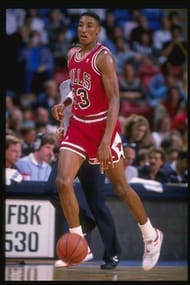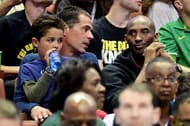Over the years, we have learned and evaluated these elements when it comes to analyzing and scouting perspective players for the college and professional levels.
Identify
Analyze the player's physical elements (hand size, hip structure, flexibility, how they warm-up and stretch).
Having the ability to recognize the positive and negative of a player's physical elements and what will translate to the next level of competition is important.
Explore the NBA Draft 2024 with our free NBA Mock Draft Simulator & be the GM of your favorite NBA team.
Being able to see a player and getting a good idea of his / her measurable physical elements is a key aspect for evaluating players. Body size for a projected "NBA, Euroleague, WBNA position".
What Translates?
What current skills does the player possess? Beyond height and weight for their current playing position, what skill set does the player currently have and is it translating to a higher level of competition is all essential in the scouting process.
It is important to understand that each position is different. For example, versatility is extremely important in the NBA and the Euroleague. NBA teams are using NBA defensive rules. A lot of times a player's position is determined by what positions he can defend. On offense, can they post a position or handle and pass the ball well enough to play on the perimeter?
Scottie Pippen stood at 6'8 and was designated as a small forward, however in some situations he played as a power forward or even a point guard because of the different positional skills he possessed. The term "point-forward" came about to describe Pippen's versatility on both the offensive and defensive ends.

Good information
"Good information wins" in a lot of professional and college basketball circles. The better the information, the better the opportunity a scout has to make a reliable and confident decision.. To do this, your information needs to be coming from reliable sources.
For example, "DraftExpress.com" has a reputation for being an agent based website, which means that the website is only providing information that the player’s agent wants to be known. Controlled information is not very reliable or usable.
This is why you need to develop healthy and trusting relationships with reliable sources (coaches, assistant coaches, opposing head and assistant coaches, non-agent influenced media sources and vetted general sources of information).
Efficient travel
Probably one of the hardest things to do in scouting is scheduling. You want to make sure you are not wasting time or resources.
Any wasted time could result in missing out on vital information. Take the time to come up with the most efficient schedule that will maximize your time and resources.
Research
Daily research is a necessary duty in scouting. You have to constantly read articles, check stats, check game information, read injury reports and general information on a daily basis. Collecting this information can be tedious at times, but it is one of the most important things in the profession of scouting.

Background information
In the process of scouting, you need to find out what makes a player "tick" and the reason behind it. This means you have to dig deep and know what questions to ask or things to look for that will provide you with usable information.
For example, Tyler Herro has an incredible work ethic, is very coachable and overall is a genuine person.
This is what makes Tyler "tick" and he is this way, because of how he was raised and was taught to have great self-discipline.
Retrieving background information on prospects as a scout is vital for a team’s decision to sign or draft a certain player. They have to be a good fit for your culture and overall philosophy or at least be willing to be.
Agents
Scouting at the professional level and even at the collegiate level you need to have a good relationship with the "power brokers" of the business to know the market. You always want to stay ahead of the game and your competition.
Just like stock brokers or Wall Street investors, you need to be able to monitor the market and predict outcomes. If Romeo Langford signs with one of the top three professional basketball agencies like Excel Sports Management, there is good chance his draft stock will improve and if you know what type of relationship these agencies have with particular teams, you will have a pretty good idea of where he might get drafted.
This relationship is also important for workouts, off-season training and free agency at the NBA level. It allows you to have access which gives you first-hand information and as it was stated before this is huge in scouting or evaluating players.
Also having these relationships will help you maximize your time. The quicker you get reliable and new information will allow you the luxury to make better overall decisions on prospective players.

Be early and stay as late as you need to
Scouts are in the business of collecting information so being early or one of the first to arrive everywhere and last to leave, allows yourself ample opportunity to see, talk to as many people and learn as much as possible.
Communication
In scouting you have to stay in constant communication with your superiors (head coach, general manager, advance scout or in some cases the owner). Information you have could help a colleague in another department.
Plus, this information and communication ensures that nothing is being missed. This goes back to why relationships are so important in evaluating at the collegiate and professional levels.
Know fool's gold when you see it
Do not get fooled by one or two outliers. Be able to identify real talent. You may witness a player have the game of his life and then the next time you see him play, he might be one of the worst players on the floor.
As a scout, you have to focus your attention on that player's abilities and skills. Just because a player shoots the ball really well night-in-and-night out at the college level, does not mean they're going to be doing that in the NBA.
Never get too high or too low on a player. Always remember that the NBA or higher levels of competition has different rules, different spacing, different rotations and more versatility at every position, so you have to be able factor this in to make sound decisions based off what you know compared to what you are seeing.
That is why you may have to watch the same player 20 or more times live and then spend several more hours breaking down and analyzing film on him/her.
